Human Rights: International Frameworks, Policies, and Development
VerifiedAdded on 2023/05/30
|13
|4778
|61
Essay
AI Summary
This essay provides a comprehensive overview of human rights, examining their significance in both international and national contexts. It delves into the international human rights framework, highlighting the Universal Declaration of Human Rights and related treaties, while also exploring the core principles of universality, interdependence, equality, and humanitarianism. The essay traces the evolution of human rights, contrasting pre-21st-century perspectives, which emphasized government responsibility, with the contemporary landscape, where non-governmental organizations and private bodies play a crucial role. Furthermore, the essay discusses the challenges and gaps within the international human rights law, including instances of misuse and enforcement difficulties, offering a nuanced understanding of the complexities surrounding human rights in the modern era.
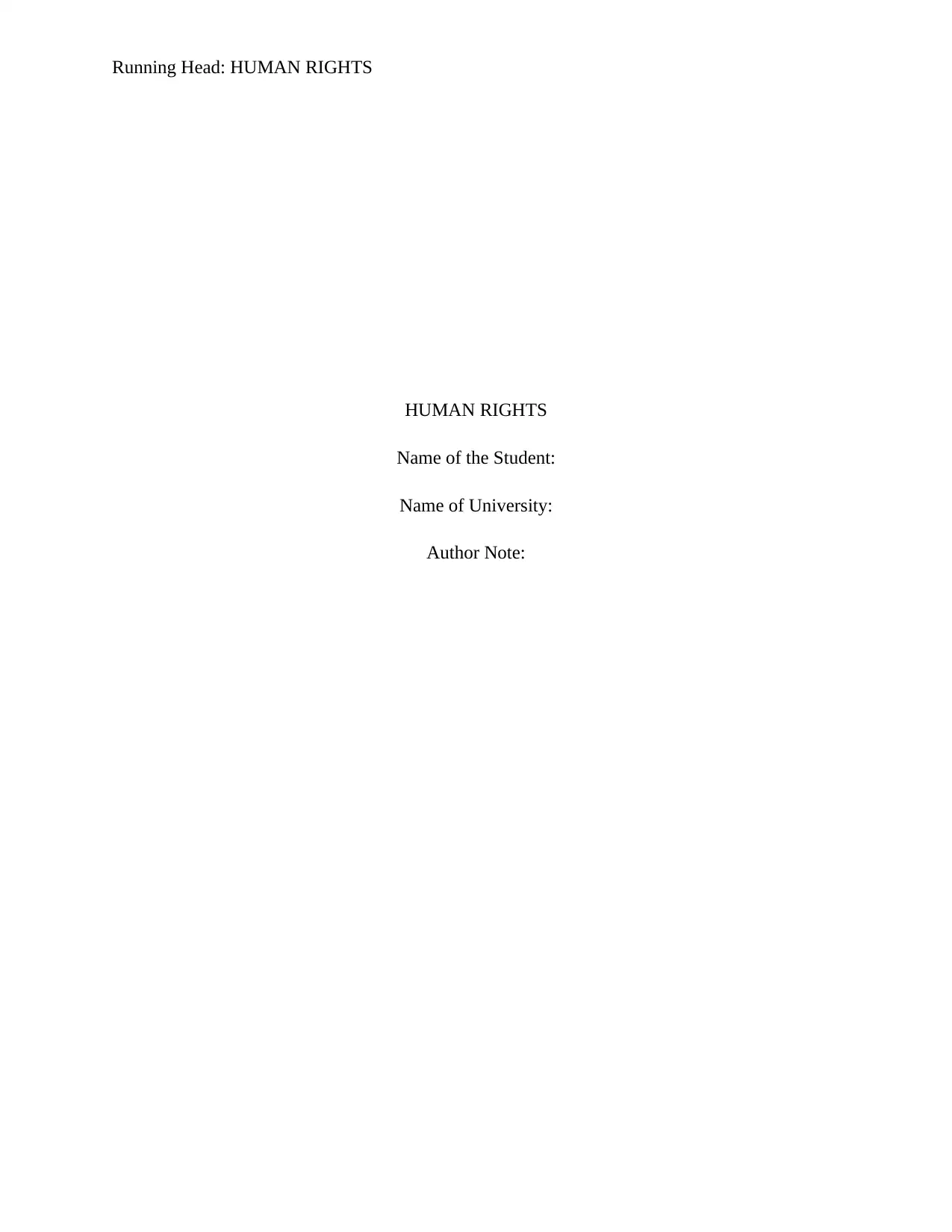
Running Head: HUMAN RIGHTS
HUMAN RIGHTS
Name of the Student:
Name of University:
Author Note:
HUMAN RIGHTS
Name of the Student:
Name of University:
Author Note:
Paraphrase This Document
Need a fresh take? Get an instant paraphrase of this document with our AI Paraphraser
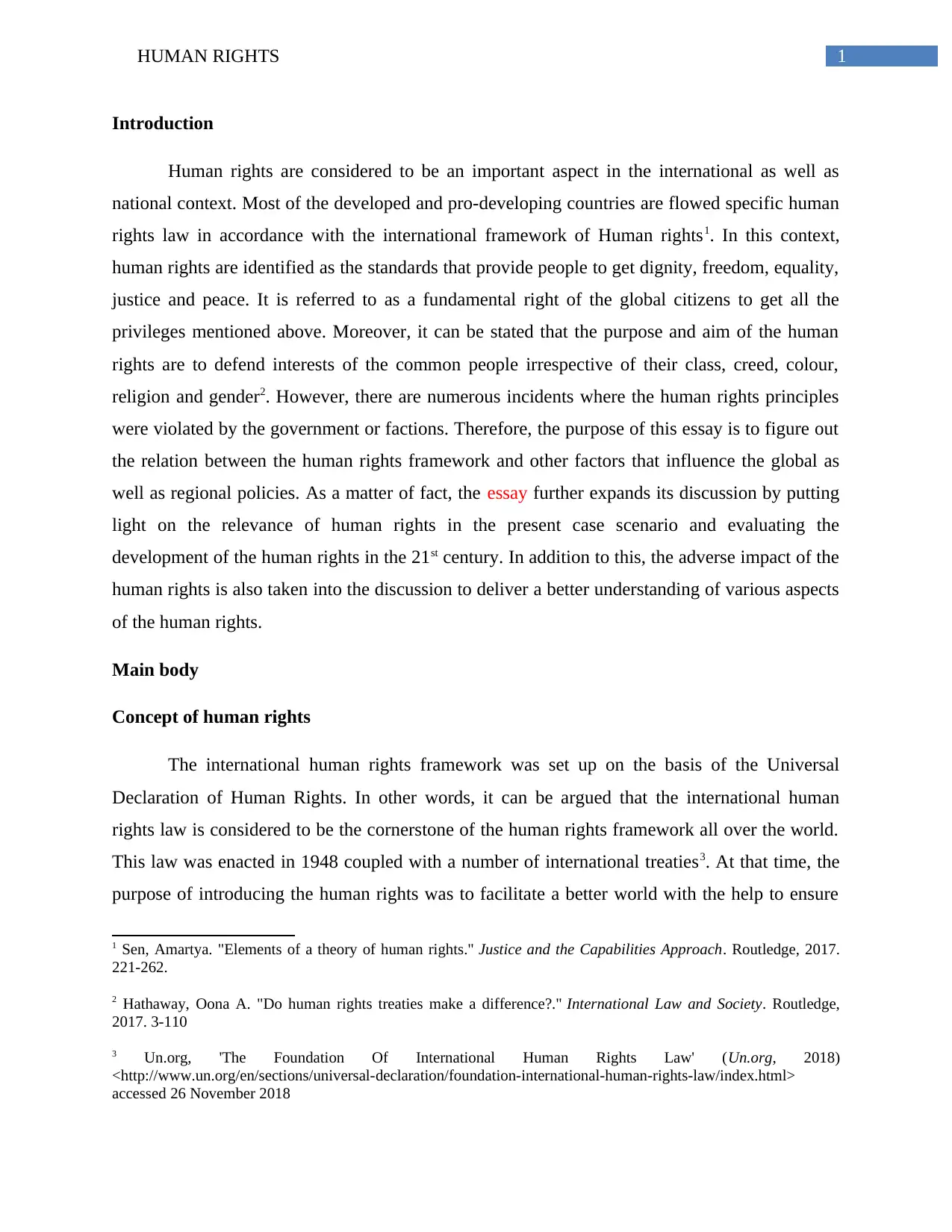
1HUMAN RIGHTS
Introduction
Human rights are considered to be an important aspect in the international as well as
national context. Most of the developed and pro-developing countries are flowed specific human
rights law in accordance with the international framework of Human rights1. In this context,
human rights are identified as the standards that provide people to get dignity, freedom, equality,
justice and peace. It is referred to as a fundamental right of the global citizens to get all the
privileges mentioned above. Moreover, it can be stated that the purpose and aim of the human
rights are to defend interests of the common people irrespective of their class, creed, colour,
religion and gender2. However, there are numerous incidents where the human rights principles
were violated by the government or factions. Therefore, the purpose of this essay is to figure out
the relation between the human rights framework and other factors that influence the global as
well as regional policies. As a matter of fact, the essay further expands its discussion by putting
light on the relevance of human rights in the present case scenario and evaluating the
development of the human rights in the 21st century. In addition to this, the adverse impact of the
human rights is also taken into the discussion to deliver a better understanding of various aspects
of the human rights.
Main body
Concept of human rights
The international human rights framework was set up on the basis of the Universal
Declaration of Human Rights. In other words, it can be argued that the international human
rights law is considered to be the cornerstone of the human rights framework all over the world.
This law was enacted in 1948 coupled with a number of international treaties3. At that time, the
purpose of introducing the human rights was to facilitate a better world with the help to ensure
1 Sen, Amartya. "Elements of a theory of human rights." Justice and the Capabilities Approach. Routledge, 2017.
221-262.
2 Hathaway, Oona A. "Do human rights treaties make a difference?." International Law and Society. Routledge,
2017. 3-110
3 Un.org, 'The Foundation Of International Human Rights Law' (Un.org, 2018)
<http://www.un.org/en/sections/universal-declaration/foundation-international-human-rights-law/index.html>
accessed 26 November 2018
Introduction
Human rights are considered to be an important aspect in the international as well as
national context. Most of the developed and pro-developing countries are flowed specific human
rights law in accordance with the international framework of Human rights1. In this context,
human rights are identified as the standards that provide people to get dignity, freedom, equality,
justice and peace. It is referred to as a fundamental right of the global citizens to get all the
privileges mentioned above. Moreover, it can be stated that the purpose and aim of the human
rights are to defend interests of the common people irrespective of their class, creed, colour,
religion and gender2. However, there are numerous incidents where the human rights principles
were violated by the government or factions. Therefore, the purpose of this essay is to figure out
the relation between the human rights framework and other factors that influence the global as
well as regional policies. As a matter of fact, the essay further expands its discussion by putting
light on the relevance of human rights in the present case scenario and evaluating the
development of the human rights in the 21st century. In addition to this, the adverse impact of the
human rights is also taken into the discussion to deliver a better understanding of various aspects
of the human rights.
Main body
Concept of human rights
The international human rights framework was set up on the basis of the Universal
Declaration of Human Rights. In other words, it can be argued that the international human
rights law is considered to be the cornerstone of the human rights framework all over the world.
This law was enacted in 1948 coupled with a number of international treaties3. At that time, the
purpose of introducing the human rights was to facilitate a better world with the help to ensure
1 Sen, Amartya. "Elements of a theory of human rights." Justice and the Capabilities Approach. Routledge, 2017.
221-262.
2 Hathaway, Oona A. "Do human rights treaties make a difference?." International Law and Society. Routledge,
2017. 3-110
3 Un.org, 'The Foundation Of International Human Rights Law' (Un.org, 2018)
<http://www.un.org/en/sections/universal-declaration/foundation-international-human-rights-law/index.html>
accessed 26 November 2018
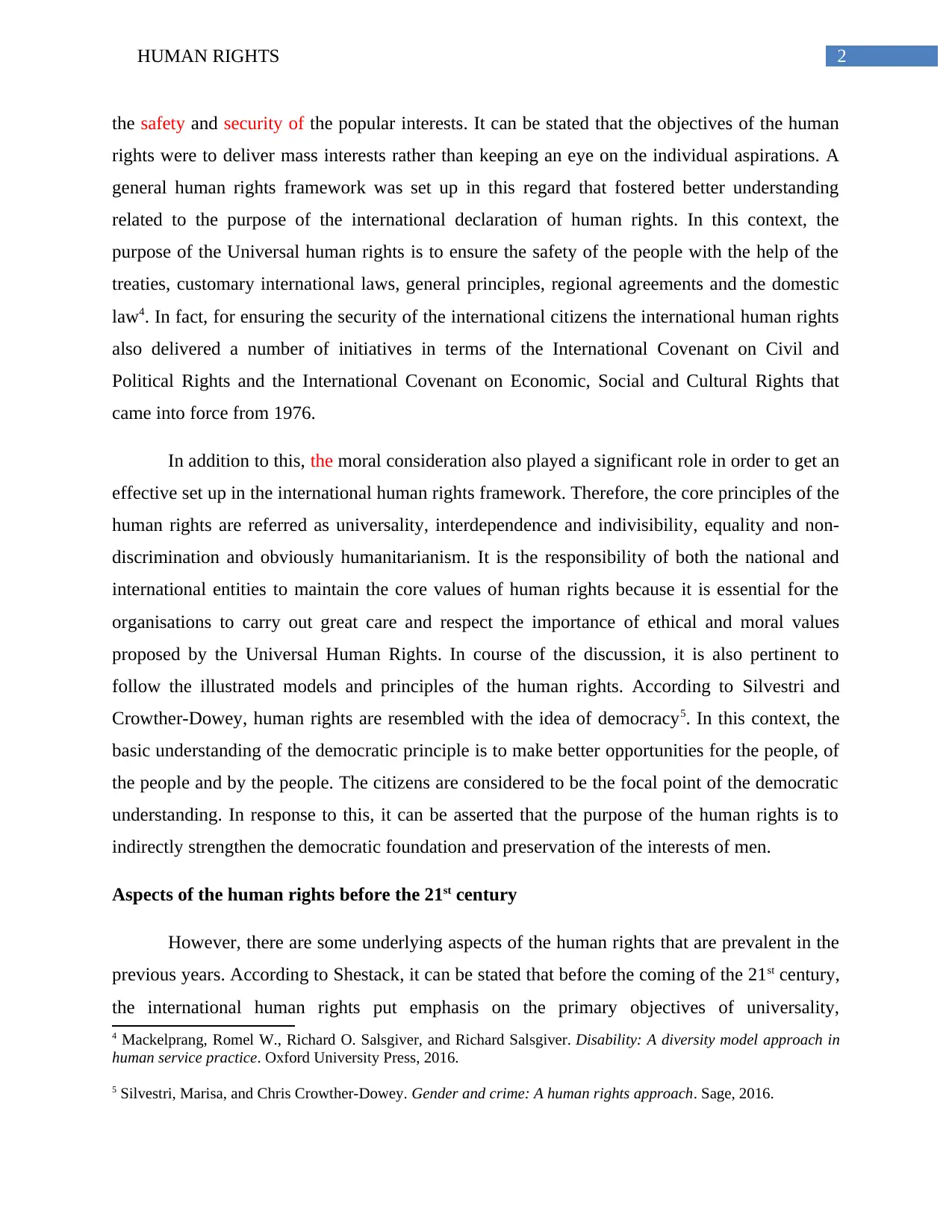
2HUMAN RIGHTS
the safety and security of the popular interests. It can be stated that the objectives of the human
rights were to deliver mass interests rather than keeping an eye on the individual aspirations. A
general human rights framework was set up in this regard that fostered better understanding
related to the purpose of the international declaration of human rights. In this context, the
purpose of the Universal human rights is to ensure the safety of the people with the help of the
treaties, customary international laws, general principles, regional agreements and the domestic
law4. In fact, for ensuring the security of the international citizens the international human rights
also delivered a number of initiatives in terms of the International Covenant on Civil and
Political Rights and the International Covenant on Economic, Social and Cultural Rights that
came into force from 1976.
In addition to this, the moral consideration also played a significant role in order to get an
effective set up in the international human rights framework. Therefore, the core principles of the
human rights are referred as universality, interdependence and indivisibility, equality and non-
discrimination and obviously humanitarianism. It is the responsibility of both the national and
international entities to maintain the core values of human rights because it is essential for the
organisations to carry out great care and respect the importance of ethical and moral values
proposed by the Universal Human Rights. In course of the discussion, it is also pertinent to
follow the illustrated models and principles of the human rights. According to Silvestri and
Crowther-Dowey, human rights are resembled with the idea of democracy5. In this context, the
basic understanding of the democratic principle is to make better opportunities for the people, of
the people and by the people. The citizens are considered to be the focal point of the democratic
understanding. In response to this, it can be asserted that the purpose of the human rights is to
indirectly strengthen the democratic foundation and preservation of the interests of men.
Aspects of the human rights before the 21st century
However, there are some underlying aspects of the human rights that are prevalent in the
previous years. According to Shestack, it can be stated that before the coming of the 21st century,
the international human rights put emphasis on the primary objectives of universality,
4 Mackelprang, Romel W., Richard O. Salsgiver, and Richard Salsgiver. Disability: A diversity model approach in
human service practice. Oxford University Press, 2016.
5 Silvestri, Marisa, and Chris Crowther-Dowey. Gender and crime: A human rights approach. Sage, 2016.
the safety and security of the popular interests. It can be stated that the objectives of the human
rights were to deliver mass interests rather than keeping an eye on the individual aspirations. A
general human rights framework was set up in this regard that fostered better understanding
related to the purpose of the international declaration of human rights. In this context, the
purpose of the Universal human rights is to ensure the safety of the people with the help of the
treaties, customary international laws, general principles, regional agreements and the domestic
law4. In fact, for ensuring the security of the international citizens the international human rights
also delivered a number of initiatives in terms of the International Covenant on Civil and
Political Rights and the International Covenant on Economic, Social and Cultural Rights that
came into force from 1976.
In addition to this, the moral consideration also played a significant role in order to get an
effective set up in the international human rights framework. Therefore, the core principles of the
human rights are referred as universality, interdependence and indivisibility, equality and non-
discrimination and obviously humanitarianism. It is the responsibility of both the national and
international entities to maintain the core values of human rights because it is essential for the
organisations to carry out great care and respect the importance of ethical and moral values
proposed by the Universal Human Rights. In course of the discussion, it is also pertinent to
follow the illustrated models and principles of the human rights. According to Silvestri and
Crowther-Dowey, human rights are resembled with the idea of democracy5. In this context, the
basic understanding of the democratic principle is to make better opportunities for the people, of
the people and by the people. The citizens are considered to be the focal point of the democratic
understanding. In response to this, it can be asserted that the purpose of the human rights is to
indirectly strengthen the democratic foundation and preservation of the interests of men.
Aspects of the human rights before the 21st century
However, there are some underlying aspects of the human rights that are prevalent in the
previous years. According to Shestack, it can be stated that before the coming of the 21st century,
the international human rights put emphasis on the primary objectives of universality,
4 Mackelprang, Romel W., Richard O. Salsgiver, and Richard Salsgiver. Disability: A diversity model approach in
human service practice. Oxford University Press, 2016.
5 Silvestri, Marisa, and Chris Crowther-Dowey. Gender and crime: A human rights approach. Sage, 2016.
⊘ This is a preview!⊘
Do you want full access?
Subscribe today to unlock all pages.

Trusted by 1+ million students worldwide
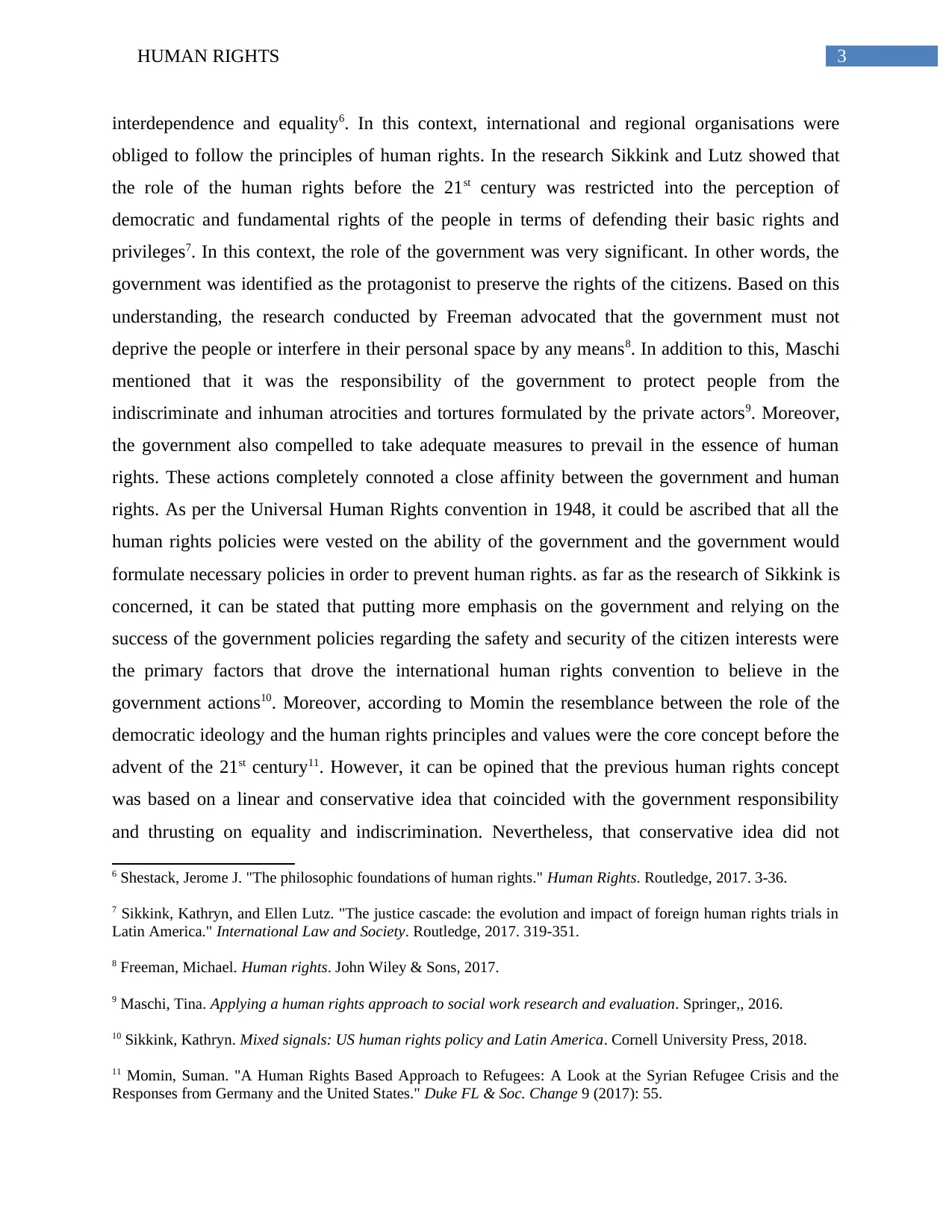
3HUMAN RIGHTS
interdependence and equality6. In this context, international and regional organisations were
obliged to follow the principles of human rights. In the research Sikkink and Lutz showed that
the role of the human rights before the 21st century was restricted into the perception of
democratic and fundamental rights of the people in terms of defending their basic rights and
privileges7. In this context, the role of the government was very significant. In other words, the
government was identified as the protagonist to preserve the rights of the citizens. Based on this
understanding, the research conducted by Freeman advocated that the government must not
deprive the people or interfere in their personal space by any means8. In addition to this, Maschi
mentioned that it was the responsibility of the government to protect people from the
indiscriminate and inhuman atrocities and tortures formulated by the private actors9. Moreover,
the government also compelled to take adequate measures to prevail in the essence of human
rights. These actions completely connoted a close affinity between the government and human
rights. As per the Universal Human Rights convention in 1948, it could be ascribed that all the
human rights policies were vested on the ability of the government and the government would
formulate necessary policies in order to prevent human rights. as far as the research of Sikkink is
concerned, it can be stated that putting more emphasis on the government and relying on the
success of the government policies regarding the safety and security of the citizen interests were
the primary factors that drove the international human rights convention to believe in the
government actions10. Moreover, according to Momin the resemblance between the role of the
democratic ideology and the human rights principles and values were the core concept before the
advent of the 21st century11. However, it can be opined that the previous human rights concept
was based on a linear and conservative idea that coincided with the government responsibility
and thrusting on equality and indiscrimination. Nevertheless, that conservative idea did not
6 Shestack, Jerome J. "The philosophic foundations of human rights." Human Rights. Routledge, 2017. 3-36.
7 Sikkink, Kathryn, and Ellen Lutz. "The justice cascade: the evolution and impact of foreign human rights trials in
Latin America." International Law and Society. Routledge, 2017. 319-351.
8 Freeman, Michael. Human rights. John Wiley & Sons, 2017.
9 Maschi, Tina. Applying a human rights approach to social work research and evaluation. Springer,, 2016.
10 Sikkink, Kathryn. Mixed signals: US human rights policy and Latin America. Cornell University Press, 2018.
11 Momin, Suman. "A Human Rights Based Approach to Refugees: A Look at the Syrian Refugee Crisis and the
Responses from Germany and the United States." Duke FL & Soc. Change 9 (2017): 55.
interdependence and equality6. In this context, international and regional organisations were
obliged to follow the principles of human rights. In the research Sikkink and Lutz showed that
the role of the human rights before the 21st century was restricted into the perception of
democratic and fundamental rights of the people in terms of defending their basic rights and
privileges7. In this context, the role of the government was very significant. In other words, the
government was identified as the protagonist to preserve the rights of the citizens. Based on this
understanding, the research conducted by Freeman advocated that the government must not
deprive the people or interfere in their personal space by any means8. In addition to this, Maschi
mentioned that it was the responsibility of the government to protect people from the
indiscriminate and inhuman atrocities and tortures formulated by the private actors9. Moreover,
the government also compelled to take adequate measures to prevail in the essence of human
rights. These actions completely connoted a close affinity between the government and human
rights. As per the Universal Human Rights convention in 1948, it could be ascribed that all the
human rights policies were vested on the ability of the government and the government would
formulate necessary policies in order to prevent human rights. as far as the research of Sikkink is
concerned, it can be stated that putting more emphasis on the government and relying on the
success of the government policies regarding the safety and security of the citizen interests were
the primary factors that drove the international human rights convention to believe in the
government actions10. Moreover, according to Momin the resemblance between the role of the
democratic ideology and the human rights principles and values were the core concept before the
advent of the 21st century11. However, it can be opined that the previous human rights concept
was based on a linear and conservative idea that coincided with the government responsibility
and thrusting on equality and indiscrimination. Nevertheless, that conservative idea did not
6 Shestack, Jerome J. "The philosophic foundations of human rights." Human Rights. Routledge, 2017. 3-36.
7 Sikkink, Kathryn, and Ellen Lutz. "The justice cascade: the evolution and impact of foreign human rights trials in
Latin America." International Law and Society. Routledge, 2017. 319-351.
8 Freeman, Michael. Human rights. John Wiley & Sons, 2017.
9 Maschi, Tina. Applying a human rights approach to social work research and evaluation. Springer,, 2016.
10 Sikkink, Kathryn. Mixed signals: US human rights policy and Latin America. Cornell University Press, 2018.
11 Momin, Suman. "A Human Rights Based Approach to Refugees: A Look at the Syrian Refugee Crisis and the
Responses from Germany and the United States." Duke FL & Soc. Change 9 (2017): 55.
Paraphrase This Document
Need a fresh take? Get an instant paraphrase of this document with our AI Paraphraser
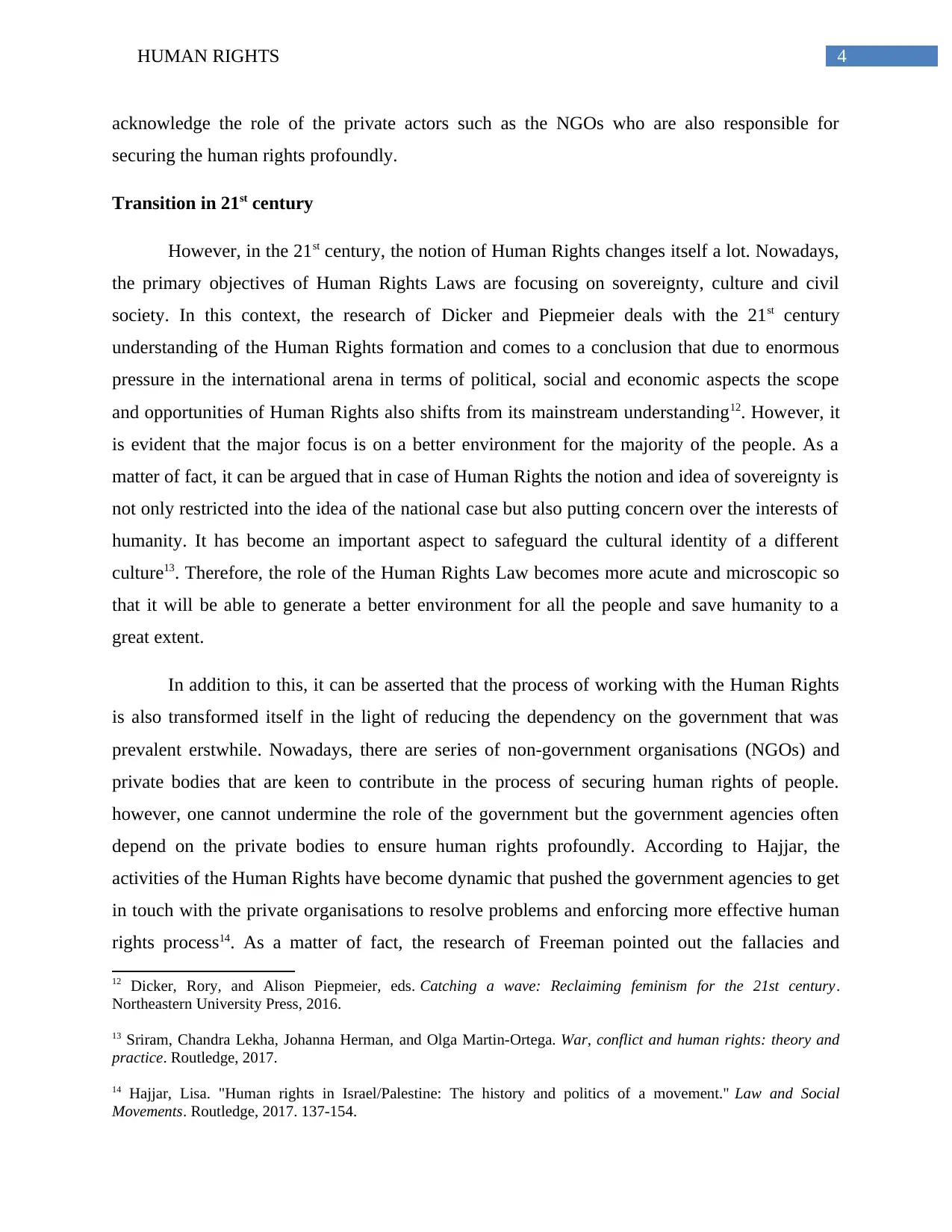
4HUMAN RIGHTS
acknowledge the role of the private actors such as the NGOs who are also responsible for
securing the human rights profoundly.
Transition in 21st century
However, in the 21st century, the notion of Human Rights changes itself a lot. Nowadays,
the primary objectives of Human Rights Laws are focusing on sovereignty, culture and civil
society. In this context, the research of Dicker and Piepmeier deals with the 21st century
understanding of the Human Rights formation and comes to a conclusion that due to enormous
pressure in the international arena in terms of political, social and economic aspects the scope
and opportunities of Human Rights also shifts from its mainstream understanding12. However, it
is evident that the major focus is on a better environment for the majority of the people. As a
matter of fact, it can be argued that in case of Human Rights the notion and idea of sovereignty is
not only restricted into the idea of the national case but also putting concern over the interests of
humanity. It has become an important aspect to safeguard the cultural identity of a different
culture13. Therefore, the role of the Human Rights Law becomes more acute and microscopic so
that it will be able to generate a better environment for all the people and save humanity to a
great extent.
In addition to this, it can be asserted that the process of working with the Human Rights
is also transformed itself in the light of reducing the dependency on the government that was
prevalent erstwhile. Nowadays, there are series of non-government organisations (NGOs) and
private bodies that are keen to contribute in the process of securing human rights of people.
however, one cannot undermine the role of the government but the government agencies often
depend on the private bodies to ensure human rights profoundly. According to Hajjar, the
activities of the Human Rights have become dynamic that pushed the government agencies to get
in touch with the private organisations to resolve problems and enforcing more effective human
rights process14. As a matter of fact, the research of Freeman pointed out the fallacies and
12 Dicker, Rory, and Alison Piepmeier, eds. Catching a wave: Reclaiming feminism for the 21st century.
Northeastern University Press, 2016.
13 Sriram, Chandra Lekha, Johanna Herman, and Olga Martin-Ortega. War, conflict and human rights: theory and
practice. Routledge, 2017.
14 Hajjar, Lisa. "Human rights in Israel/Palestine: The history and politics of a movement." Law and Social
Movements. Routledge, 2017. 137-154.
acknowledge the role of the private actors such as the NGOs who are also responsible for
securing the human rights profoundly.
Transition in 21st century
However, in the 21st century, the notion of Human Rights changes itself a lot. Nowadays,
the primary objectives of Human Rights Laws are focusing on sovereignty, culture and civil
society. In this context, the research of Dicker and Piepmeier deals with the 21st century
understanding of the Human Rights formation and comes to a conclusion that due to enormous
pressure in the international arena in terms of political, social and economic aspects the scope
and opportunities of Human Rights also shifts from its mainstream understanding12. However, it
is evident that the major focus is on a better environment for the majority of the people. As a
matter of fact, it can be argued that in case of Human Rights the notion and idea of sovereignty is
not only restricted into the idea of the national case but also putting concern over the interests of
humanity. It has become an important aspect to safeguard the cultural identity of a different
culture13. Therefore, the role of the Human Rights Law becomes more acute and microscopic so
that it will be able to generate a better environment for all the people and save humanity to a
great extent.
In addition to this, it can be asserted that the process of working with the Human Rights
is also transformed itself in the light of reducing the dependency on the government that was
prevalent erstwhile. Nowadays, there are series of non-government organisations (NGOs) and
private bodies that are keen to contribute in the process of securing human rights of people.
however, one cannot undermine the role of the government but the government agencies often
depend on the private bodies to ensure human rights profoundly. According to Hajjar, the
activities of the Human Rights have become dynamic that pushed the government agencies to get
in touch with the private organisations to resolve problems and enforcing more effective human
rights process14. As a matter of fact, the research of Freeman pointed out the fallacies and
12 Dicker, Rory, and Alison Piepmeier, eds. Catching a wave: Reclaiming feminism for the 21st century.
Northeastern University Press, 2016.
13 Sriram, Chandra Lekha, Johanna Herman, and Olga Martin-Ortega. War, conflict and human rights: theory and
practice. Routledge, 2017.
14 Hajjar, Lisa. "Human rights in Israel/Palestine: The history and politics of a movement." Law and Social
Movements. Routledge, 2017. 137-154.
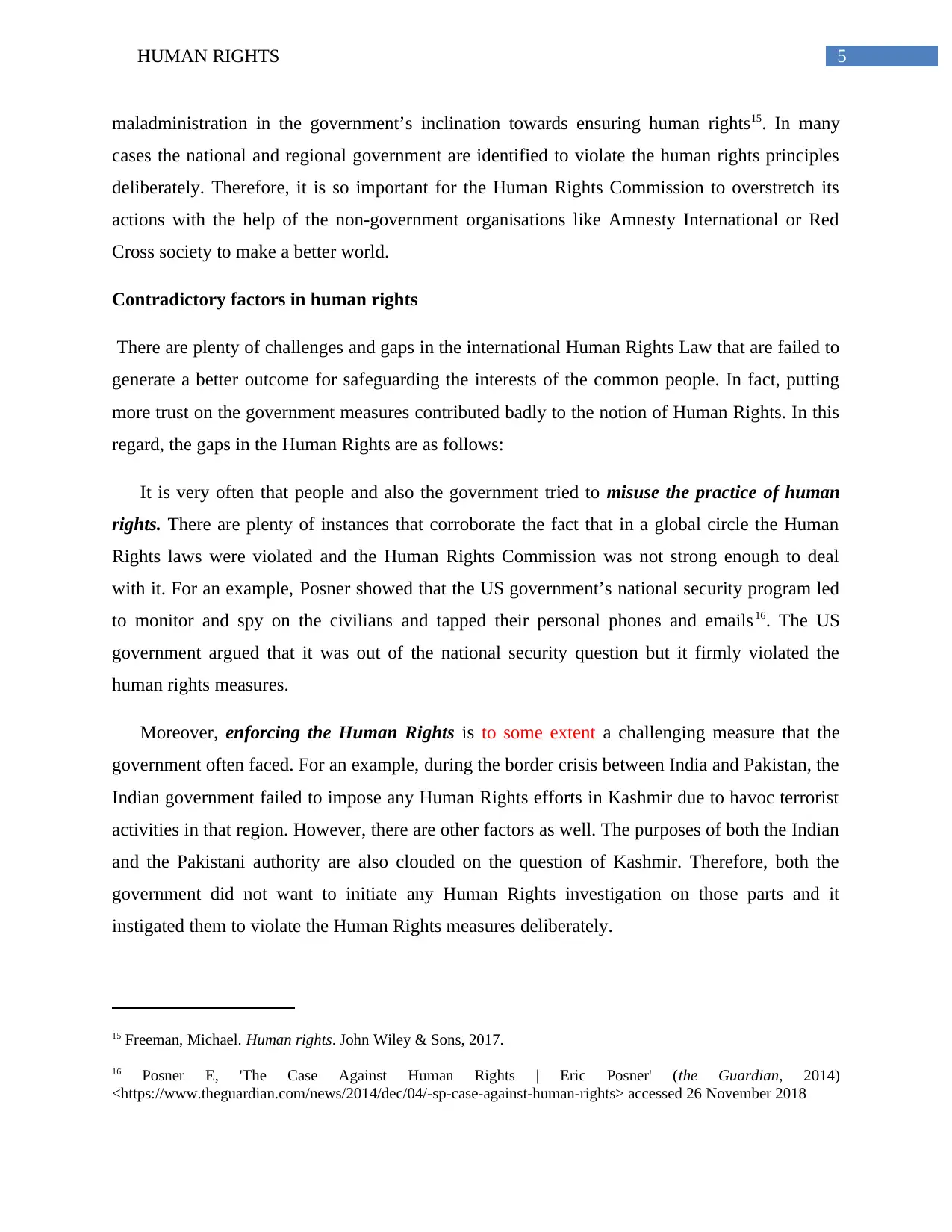
5HUMAN RIGHTS
maladministration in the government’s inclination towards ensuring human rights15. In many
cases the national and regional government are identified to violate the human rights principles
deliberately. Therefore, it is so important for the Human Rights Commission to overstretch its
actions with the help of the non-government organisations like Amnesty International or Red
Cross society to make a better world.
Contradictory factors in human rights
There are plenty of challenges and gaps in the international Human Rights Law that are failed to
generate a better outcome for safeguarding the interests of the common people. In fact, putting
more trust on the government measures contributed badly to the notion of Human Rights. In this
regard, the gaps in the Human Rights are as follows:
It is very often that people and also the government tried to misuse the practice of human
rights. There are plenty of instances that corroborate the fact that in a global circle the Human
Rights laws were violated and the Human Rights Commission was not strong enough to deal
with it. For an example, Posner showed that the US government’s national security program led
to monitor and spy on the civilians and tapped their personal phones and emails16. The US
government argued that it was out of the national security question but it firmly violated the
human rights measures.
Moreover, enforcing the Human Rights is to some extent a challenging measure that the
government often faced. For an example, during the border crisis between India and Pakistan, the
Indian government failed to impose any Human Rights efforts in Kashmir due to havoc terrorist
activities in that region. However, there are other factors as well. The purposes of both the Indian
and the Pakistani authority are also clouded on the question of Kashmir. Therefore, both the
government did not want to initiate any Human Rights investigation on those parts and it
instigated them to violate the Human Rights measures deliberately.
15 Freeman, Michael. Human rights. John Wiley & Sons, 2017.
16 Posner E, 'The Case Against Human Rights | Eric Posner' (the Guardian, 2014)
<https://www.theguardian.com/news/2014/dec/04/-sp-case-against-human-rights> accessed 26 November 2018
maladministration in the government’s inclination towards ensuring human rights15. In many
cases the national and regional government are identified to violate the human rights principles
deliberately. Therefore, it is so important for the Human Rights Commission to overstretch its
actions with the help of the non-government organisations like Amnesty International or Red
Cross society to make a better world.
Contradictory factors in human rights
There are plenty of challenges and gaps in the international Human Rights Law that are failed to
generate a better outcome for safeguarding the interests of the common people. In fact, putting
more trust on the government measures contributed badly to the notion of Human Rights. In this
regard, the gaps in the Human Rights are as follows:
It is very often that people and also the government tried to misuse the practice of human
rights. There are plenty of instances that corroborate the fact that in a global circle the Human
Rights laws were violated and the Human Rights Commission was not strong enough to deal
with it. For an example, Posner showed that the US government’s national security program led
to monitor and spy on the civilians and tapped their personal phones and emails16. The US
government argued that it was out of the national security question but it firmly violated the
human rights measures.
Moreover, enforcing the Human Rights is to some extent a challenging measure that the
government often faced. For an example, during the border crisis between India and Pakistan, the
Indian government failed to impose any Human Rights efforts in Kashmir due to havoc terrorist
activities in that region. However, there are other factors as well. The purposes of both the Indian
and the Pakistani authority are also clouded on the question of Kashmir. Therefore, both the
government did not want to initiate any Human Rights investigation on those parts and it
instigated them to violate the Human Rights measures deliberately.
15 Freeman, Michael. Human rights. John Wiley & Sons, 2017.
16 Posner E, 'The Case Against Human Rights | Eric Posner' (the Guardian, 2014)
<https://www.theguardian.com/news/2014/dec/04/-sp-case-against-human-rights> accessed 26 November 2018
⊘ This is a preview!⊘
Do you want full access?
Subscribe today to unlock all pages.

Trusted by 1+ million students worldwide
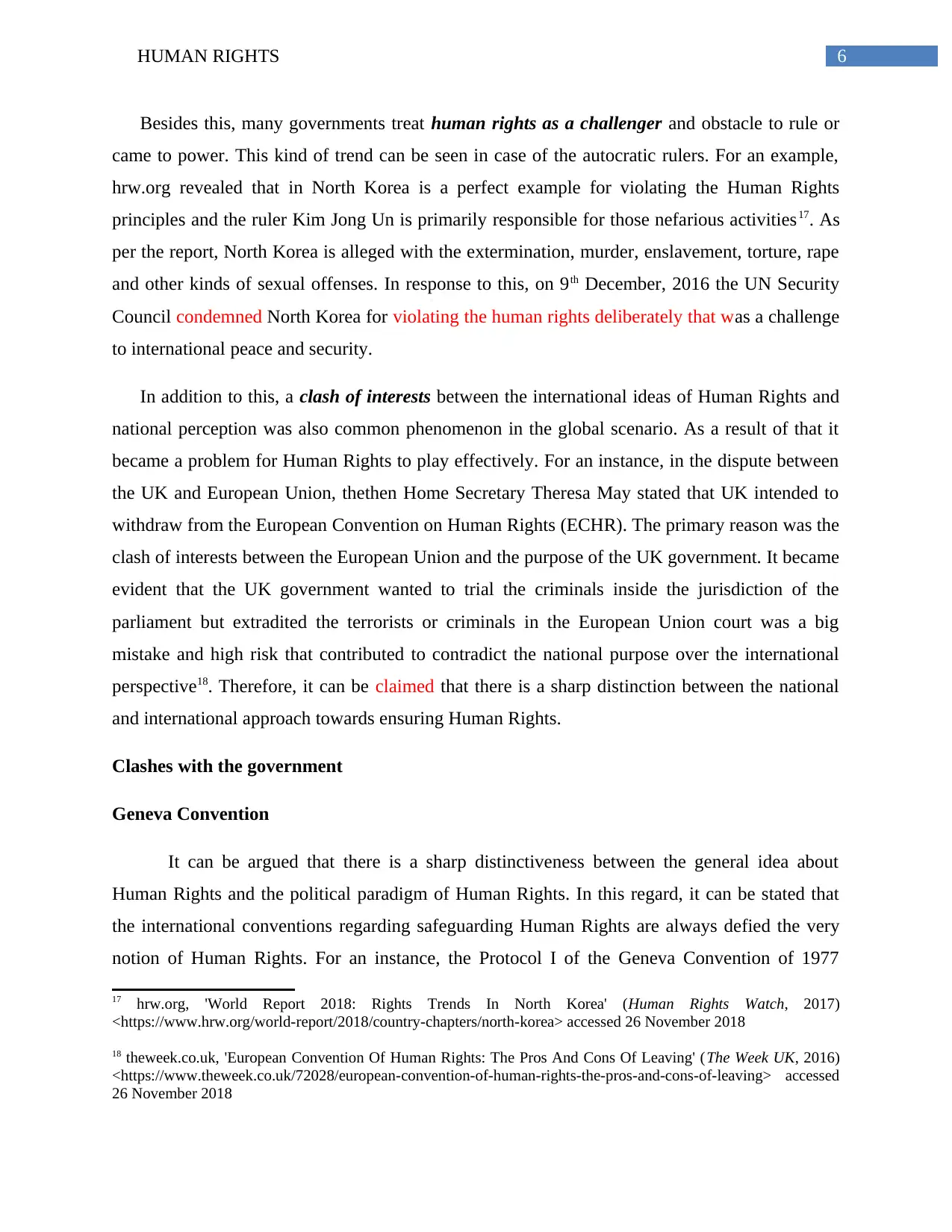
6HUMAN RIGHTS
Besides this, many governments treat human rights as a challenger and obstacle to rule or
came to power. This kind of trend can be seen in case of the autocratic rulers. For an example,
hrw.org revealed that in North Korea is a perfect example for violating the Human Rights
principles and the ruler Kim Jong Un is primarily responsible for those nefarious activities17. As
per the report, North Korea is alleged with the extermination, murder, enslavement, torture, rape
and other kinds of sexual offenses. In response to this, on 9th December, 2016 the UN Security
Council condemned North Korea for violating the human rights deliberately that was a challenge
to international peace and security.
In addition to this, a clash of interests between the international ideas of Human Rights and
national perception was also common phenomenon in the global scenario. As a result of that it
became a problem for Human Rights to play effectively. For an instance, in the dispute between
the UK and European Union, thethen Home Secretary Theresa May stated that UK intended to
withdraw from the European Convention on Human Rights (ECHR). The primary reason was the
clash of interests between the European Union and the purpose of the UK government. It became
evident that the UK government wanted to trial the criminals inside the jurisdiction of the
parliament but extradited the terrorists or criminals in the European Union court was a big
mistake and high risk that contributed to contradict the national purpose over the international
perspective18. Therefore, it can be claimed that there is a sharp distinction between the national
and international approach towards ensuring Human Rights.
Clashes with the government
Geneva Convention
It can be argued that there is a sharp distinctiveness between the general idea about
Human Rights and the political paradigm of Human Rights. In this regard, it can be stated that
the international conventions regarding safeguarding Human Rights are always defied the very
notion of Human Rights. For an instance, the Protocol I of the Geneva Convention of 1977
17 hrw.org, 'World Report 2018: Rights Trends In North Korea' (Human Rights Watch, 2017)
<https://www.hrw.org/world-report/2018/country-chapters/north-korea> accessed 26 November 2018
18 theweek.co.uk, 'European Convention Of Human Rights: The Pros And Cons Of Leaving' (The Week UK, 2016)
<https://www.theweek.co.uk/72028/european-convention-of-human-rights-the-pros-and-cons-of-leaving> accessed
26 November 2018
Besides this, many governments treat human rights as a challenger and obstacle to rule or
came to power. This kind of trend can be seen in case of the autocratic rulers. For an example,
hrw.org revealed that in North Korea is a perfect example for violating the Human Rights
principles and the ruler Kim Jong Un is primarily responsible for those nefarious activities17. As
per the report, North Korea is alleged with the extermination, murder, enslavement, torture, rape
and other kinds of sexual offenses. In response to this, on 9th December, 2016 the UN Security
Council condemned North Korea for violating the human rights deliberately that was a challenge
to international peace and security.
In addition to this, a clash of interests between the international ideas of Human Rights and
national perception was also common phenomenon in the global scenario. As a result of that it
became a problem for Human Rights to play effectively. For an instance, in the dispute between
the UK and European Union, thethen Home Secretary Theresa May stated that UK intended to
withdraw from the European Convention on Human Rights (ECHR). The primary reason was the
clash of interests between the European Union and the purpose of the UK government. It became
evident that the UK government wanted to trial the criminals inside the jurisdiction of the
parliament but extradited the terrorists or criminals in the European Union court was a big
mistake and high risk that contributed to contradict the national purpose over the international
perspective18. Therefore, it can be claimed that there is a sharp distinction between the national
and international approach towards ensuring Human Rights.
Clashes with the government
Geneva Convention
It can be argued that there is a sharp distinctiveness between the general idea about
Human Rights and the political paradigm of Human Rights. In this regard, it can be stated that
the international conventions regarding safeguarding Human Rights are always defied the very
notion of Human Rights. For an instance, the Protocol I of the Geneva Convention of 1977
17 hrw.org, 'World Report 2018: Rights Trends In North Korea' (Human Rights Watch, 2017)
<https://www.hrw.org/world-report/2018/country-chapters/north-korea> accessed 26 November 2018
18 theweek.co.uk, 'European Convention Of Human Rights: The Pros And Cons Of Leaving' (The Week UK, 2016)
<https://www.theweek.co.uk/72028/european-convention-of-human-rights-the-pros-and-cons-of-leaving> accessed
26 November 2018
Paraphrase This Document
Need a fresh take? Get an instant paraphrase of this document with our AI Paraphraser
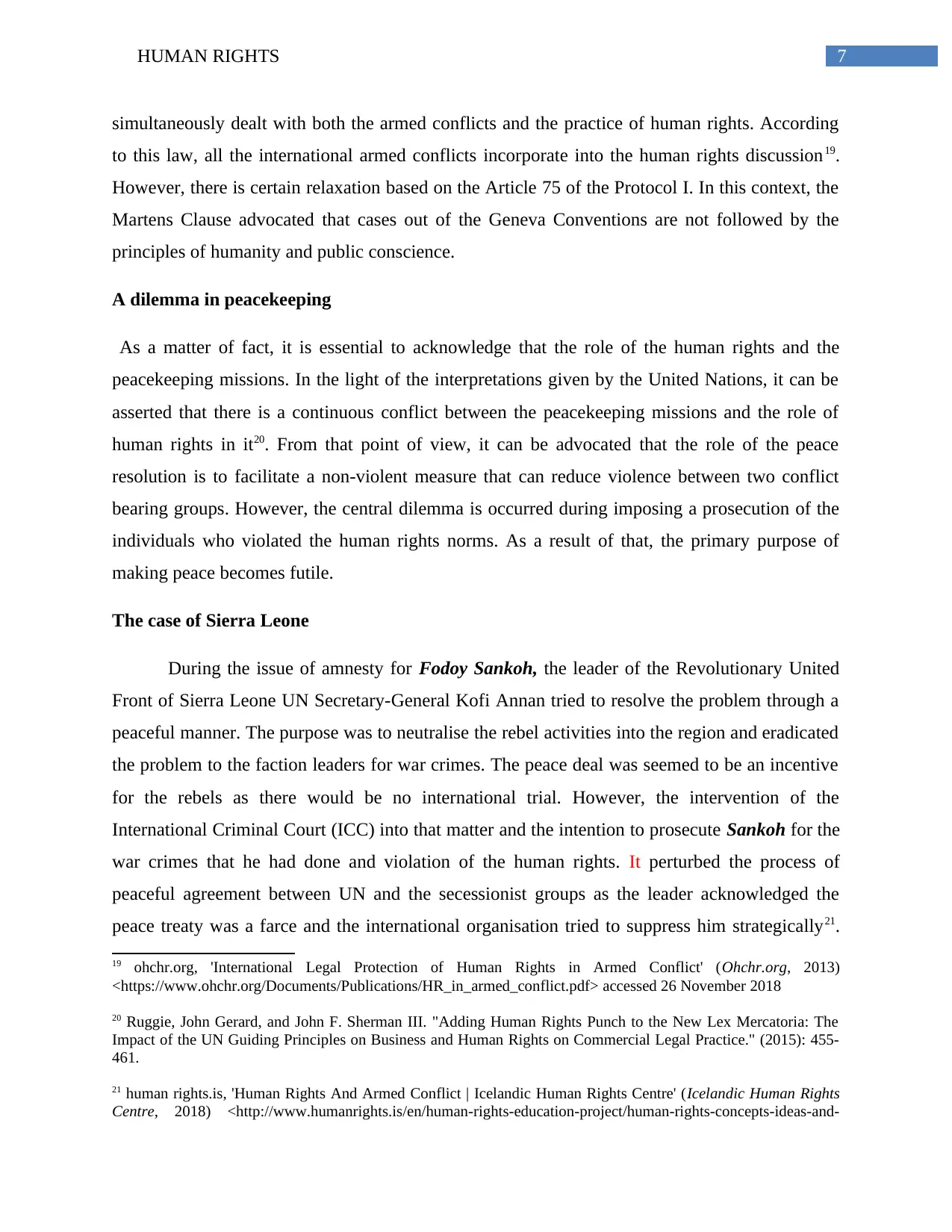
7HUMAN RIGHTS
simultaneously dealt with both the armed conflicts and the practice of human rights. According
to this law, all the international armed conflicts incorporate into the human rights discussion19.
However, there is certain relaxation based on the Article 75 of the Protocol I. In this context, the
Martens Clause advocated that cases out of the Geneva Conventions are not followed by the
principles of humanity and public conscience.
A dilemma in peacekeeping
As a matter of fact, it is essential to acknowledge that the role of the human rights and the
peacekeeping missions. In the light of the interpretations given by the United Nations, it can be
asserted that there is a continuous conflict between the peacekeeping missions and the role of
human rights in it20. From that point of view, it can be advocated that the role of the peace
resolution is to facilitate a non-violent measure that can reduce violence between two conflict
bearing groups. However, the central dilemma is occurred during imposing a prosecution of the
individuals who violated the human rights norms. As a result of that, the primary purpose of
making peace becomes futile.
The case of Sierra Leone
During the issue of amnesty for Fodoy Sankoh, the leader of the Revolutionary United
Front of Sierra Leone UN Secretary-General Kofi Annan tried to resolve the problem through a
peaceful manner. The purpose was to neutralise the rebel activities into the region and eradicated
the problem to the faction leaders for war crimes. The peace deal was seemed to be an incentive
for the rebels as there would be no international trial. However, the intervention of the
International Criminal Court (ICC) into that matter and the intention to prosecute Sankoh for the
war crimes that he had done and violation of the human rights. It perturbed the process of
peaceful agreement between UN and the secessionist groups as the leader acknowledged the
peace treaty was a farce and the international organisation tried to suppress him strategically21.
19 ohchr.org, 'International Legal Protection of Human Rights in Armed Conflict' (Ohchr.org, 2013)
<https://www.ohchr.org/Documents/Publications/HR_in_armed_conflict.pdf> accessed 26 November 2018
20 Ruggie, John Gerard, and John F. Sherman III. "Adding Human Rights Punch to the New Lex Mercatoria: The
Impact of the UN Guiding Principles on Business and Human Rights on Commercial Legal Practice." (2015): 455-
461.
21 human rights.is, 'Human Rights And Armed Conflict | Icelandic Human Rights Centre' (Icelandic Human Rights
Centre, 2018) <http://www.humanrights.is/en/human-rights-education-project/human-rights-concepts-ideas-and-
simultaneously dealt with both the armed conflicts and the practice of human rights. According
to this law, all the international armed conflicts incorporate into the human rights discussion19.
However, there is certain relaxation based on the Article 75 of the Protocol I. In this context, the
Martens Clause advocated that cases out of the Geneva Conventions are not followed by the
principles of humanity and public conscience.
A dilemma in peacekeeping
As a matter of fact, it is essential to acknowledge that the role of the human rights and the
peacekeeping missions. In the light of the interpretations given by the United Nations, it can be
asserted that there is a continuous conflict between the peacekeeping missions and the role of
human rights in it20. From that point of view, it can be advocated that the role of the peace
resolution is to facilitate a non-violent measure that can reduce violence between two conflict
bearing groups. However, the central dilemma is occurred during imposing a prosecution of the
individuals who violated the human rights norms. As a result of that, the primary purpose of
making peace becomes futile.
The case of Sierra Leone
During the issue of amnesty for Fodoy Sankoh, the leader of the Revolutionary United
Front of Sierra Leone UN Secretary-General Kofi Annan tried to resolve the problem through a
peaceful manner. The purpose was to neutralise the rebel activities into the region and eradicated
the problem to the faction leaders for war crimes. The peace deal was seemed to be an incentive
for the rebels as there would be no international trial. However, the intervention of the
International Criminal Court (ICC) into that matter and the intention to prosecute Sankoh for the
war crimes that he had done and violation of the human rights. It perturbed the process of
peaceful agreement between UN and the secessionist groups as the leader acknowledged the
peace treaty was a farce and the international organisation tried to suppress him strategically21.
19 ohchr.org, 'International Legal Protection of Human Rights in Armed Conflict' (Ohchr.org, 2013)
<https://www.ohchr.org/Documents/Publications/HR_in_armed_conflict.pdf> accessed 26 November 2018
20 Ruggie, John Gerard, and John F. Sherman III. "Adding Human Rights Punch to the New Lex Mercatoria: The
Impact of the UN Guiding Principles on Business and Human Rights on Commercial Legal Practice." (2015): 455-
461.
21 human rights.is, 'Human Rights And Armed Conflict | Icelandic Human Rights Centre' (Icelandic Human Rights
Centre, 2018) <http://www.humanrights.is/en/human-rights-education-project/human-rights-concepts-ideas-and-
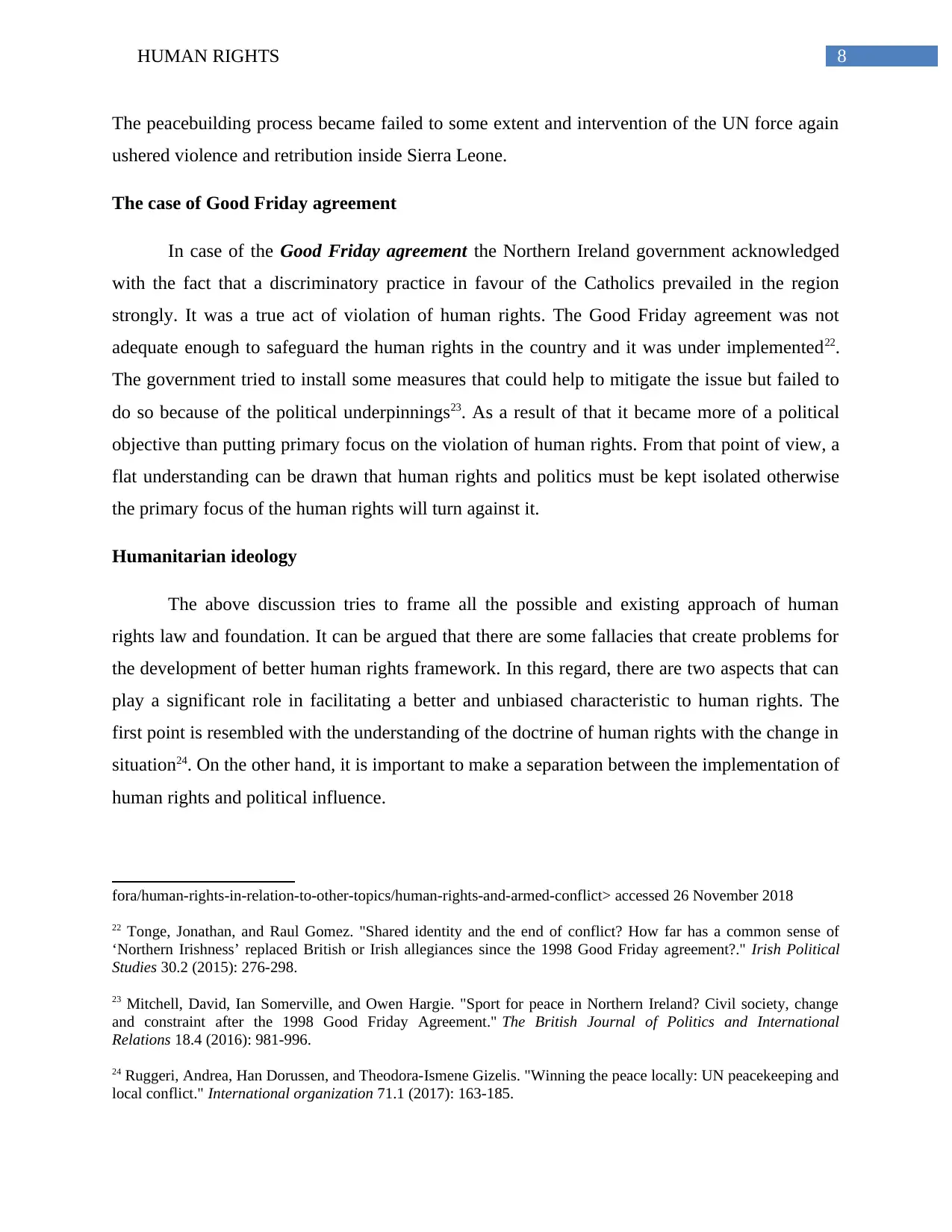
8HUMAN RIGHTS
The peacebuilding process became failed to some extent and intervention of the UN force again
ushered violence and retribution inside Sierra Leone.
The case of Good Friday agreement
In case of the Good Friday agreement the Northern Ireland government acknowledged
with the fact that a discriminatory practice in favour of the Catholics prevailed in the region
strongly. It was a true act of violation of human rights. The Good Friday agreement was not
adequate enough to safeguard the human rights in the country and it was under implemented22.
The government tried to install some measures that could help to mitigate the issue but failed to
do so because of the political underpinnings23. As a result of that it became more of a political
objective than putting primary focus on the violation of human rights. From that point of view, a
flat understanding can be drawn that human rights and politics must be kept isolated otherwise
the primary focus of the human rights will turn against it.
Humanitarian ideology
The above discussion tries to frame all the possible and existing approach of human
rights law and foundation. It can be argued that there are some fallacies that create problems for
the development of better human rights framework. In this regard, there are two aspects that can
play a significant role in facilitating a better and unbiased characteristic to human rights. The
first point is resembled with the understanding of the doctrine of human rights with the change in
situation24. On the other hand, it is important to make a separation between the implementation of
human rights and political influence.
fora/human-rights-in-relation-to-other-topics/human-rights-and-armed-conflict> accessed 26 November 2018
22 Tonge, Jonathan, and Raul Gomez. "Shared identity and the end of conflict? How far has a common sense of
‘Northern Irishness’ replaced British or Irish allegiances since the 1998 Good Friday agreement?." Irish Political
Studies 30.2 (2015): 276-298.
23 Mitchell, David, Ian Somerville, and Owen Hargie. "Sport for peace in Northern Ireland? Civil society, change
and constraint after the 1998 Good Friday Agreement." The British Journal of Politics and International
Relations 18.4 (2016): 981-996.
24 Ruggeri, Andrea, Han Dorussen, and Theodora-Ismene Gizelis. "Winning the peace locally: UN peacekeeping and
local conflict." International organization 71.1 (2017): 163-185.
The peacebuilding process became failed to some extent and intervention of the UN force again
ushered violence and retribution inside Sierra Leone.
The case of Good Friday agreement
In case of the Good Friday agreement the Northern Ireland government acknowledged
with the fact that a discriminatory practice in favour of the Catholics prevailed in the region
strongly. It was a true act of violation of human rights. The Good Friday agreement was not
adequate enough to safeguard the human rights in the country and it was under implemented22.
The government tried to install some measures that could help to mitigate the issue but failed to
do so because of the political underpinnings23. As a result of that it became more of a political
objective than putting primary focus on the violation of human rights. From that point of view, a
flat understanding can be drawn that human rights and politics must be kept isolated otherwise
the primary focus of the human rights will turn against it.
Humanitarian ideology
The above discussion tries to frame all the possible and existing approach of human
rights law and foundation. It can be argued that there are some fallacies that create problems for
the development of better human rights framework. In this regard, there are two aspects that can
play a significant role in facilitating a better and unbiased characteristic to human rights. The
first point is resembled with the understanding of the doctrine of human rights with the change in
situation24. On the other hand, it is important to make a separation between the implementation of
human rights and political influence.
fora/human-rights-in-relation-to-other-topics/human-rights-and-armed-conflict> accessed 26 November 2018
22 Tonge, Jonathan, and Raul Gomez. "Shared identity and the end of conflict? How far has a common sense of
‘Northern Irishness’ replaced British or Irish allegiances since the 1998 Good Friday agreement?." Irish Political
Studies 30.2 (2015): 276-298.
23 Mitchell, David, Ian Somerville, and Owen Hargie. "Sport for peace in Northern Ireland? Civil society, change
and constraint after the 1998 Good Friday Agreement." The British Journal of Politics and International
Relations 18.4 (2016): 981-996.
24 Ruggeri, Andrea, Han Dorussen, and Theodora-Ismene Gizelis. "Winning the peace locally: UN peacekeeping and
local conflict." International organization 71.1 (2017): 163-185.
⊘ This is a preview!⊘
Do you want full access?
Subscribe today to unlock all pages.

Trusted by 1+ million students worldwide
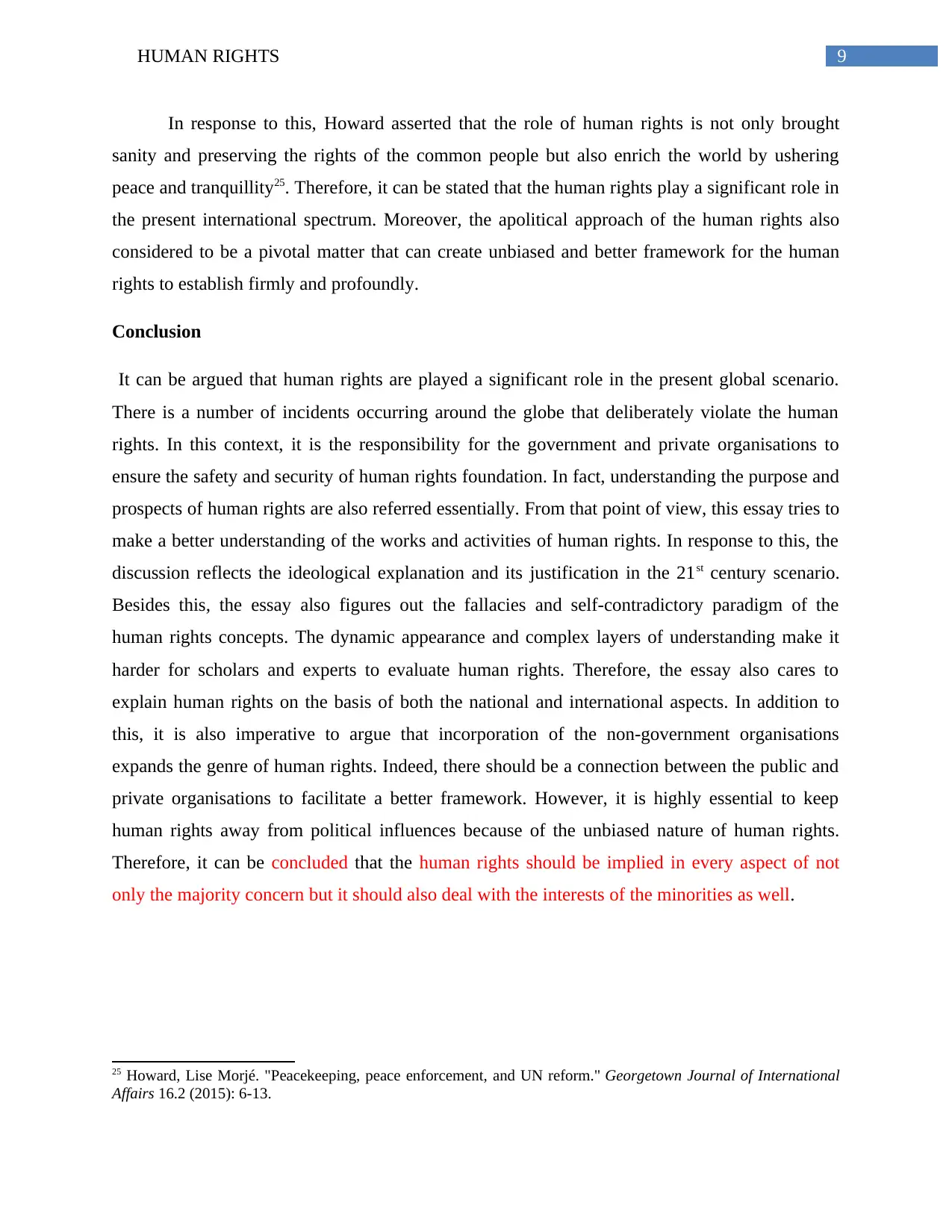
9HUMAN RIGHTS
In response to this, Howard asserted that the role of human rights is not only brought
sanity and preserving the rights of the common people but also enrich the world by ushering
peace and tranquillity25. Therefore, it can be stated that the human rights play a significant role in
the present international spectrum. Moreover, the apolitical approach of the human rights also
considered to be a pivotal matter that can create unbiased and better framework for the human
rights to establish firmly and profoundly.
Conclusion
It can be argued that human rights are played a significant role in the present global scenario.
There is a number of incidents occurring around the globe that deliberately violate the human
rights. In this context, it is the responsibility for the government and private organisations to
ensure the safety and security of human rights foundation. In fact, understanding the purpose and
prospects of human rights are also referred essentially. From that point of view, this essay tries to
make a better understanding of the works and activities of human rights. In response to this, the
discussion reflects the ideological explanation and its justification in the 21st century scenario.
Besides this, the essay also figures out the fallacies and self-contradictory paradigm of the
human rights concepts. The dynamic appearance and complex layers of understanding make it
harder for scholars and experts to evaluate human rights. Therefore, the essay also cares to
explain human rights on the basis of both the national and international aspects. In addition to
this, it is also imperative to argue that incorporation of the non-government organisations
expands the genre of human rights. Indeed, there should be a connection between the public and
private organisations to facilitate a better framework. However, it is highly essential to keep
human rights away from political influences because of the unbiased nature of human rights.
Therefore, it can be concluded that the human rights should be implied in every aspect of not
only the majority concern but it should also deal with the interests of the minorities as well.
25 Howard, Lise Morjé. "Peacekeeping, peace enforcement, and UN reform." Georgetown Journal of International
Affairs 16.2 (2015): 6-13.
In response to this, Howard asserted that the role of human rights is not only brought
sanity and preserving the rights of the common people but also enrich the world by ushering
peace and tranquillity25. Therefore, it can be stated that the human rights play a significant role in
the present international spectrum. Moreover, the apolitical approach of the human rights also
considered to be a pivotal matter that can create unbiased and better framework for the human
rights to establish firmly and profoundly.
Conclusion
It can be argued that human rights are played a significant role in the present global scenario.
There is a number of incidents occurring around the globe that deliberately violate the human
rights. In this context, it is the responsibility for the government and private organisations to
ensure the safety and security of human rights foundation. In fact, understanding the purpose and
prospects of human rights are also referred essentially. From that point of view, this essay tries to
make a better understanding of the works and activities of human rights. In response to this, the
discussion reflects the ideological explanation and its justification in the 21st century scenario.
Besides this, the essay also figures out the fallacies and self-contradictory paradigm of the
human rights concepts. The dynamic appearance and complex layers of understanding make it
harder for scholars and experts to evaluate human rights. Therefore, the essay also cares to
explain human rights on the basis of both the national and international aspects. In addition to
this, it is also imperative to argue that incorporation of the non-government organisations
expands the genre of human rights. Indeed, there should be a connection between the public and
private organisations to facilitate a better framework. However, it is highly essential to keep
human rights away from political influences because of the unbiased nature of human rights.
Therefore, it can be concluded that the human rights should be implied in every aspect of not
only the majority concern but it should also deal with the interests of the minorities as well.
25 Howard, Lise Morjé. "Peacekeeping, peace enforcement, and UN reform." Georgetown Journal of International
Affairs 16.2 (2015): 6-13.
Paraphrase This Document
Need a fresh take? Get an instant paraphrase of this document with our AI Paraphraser
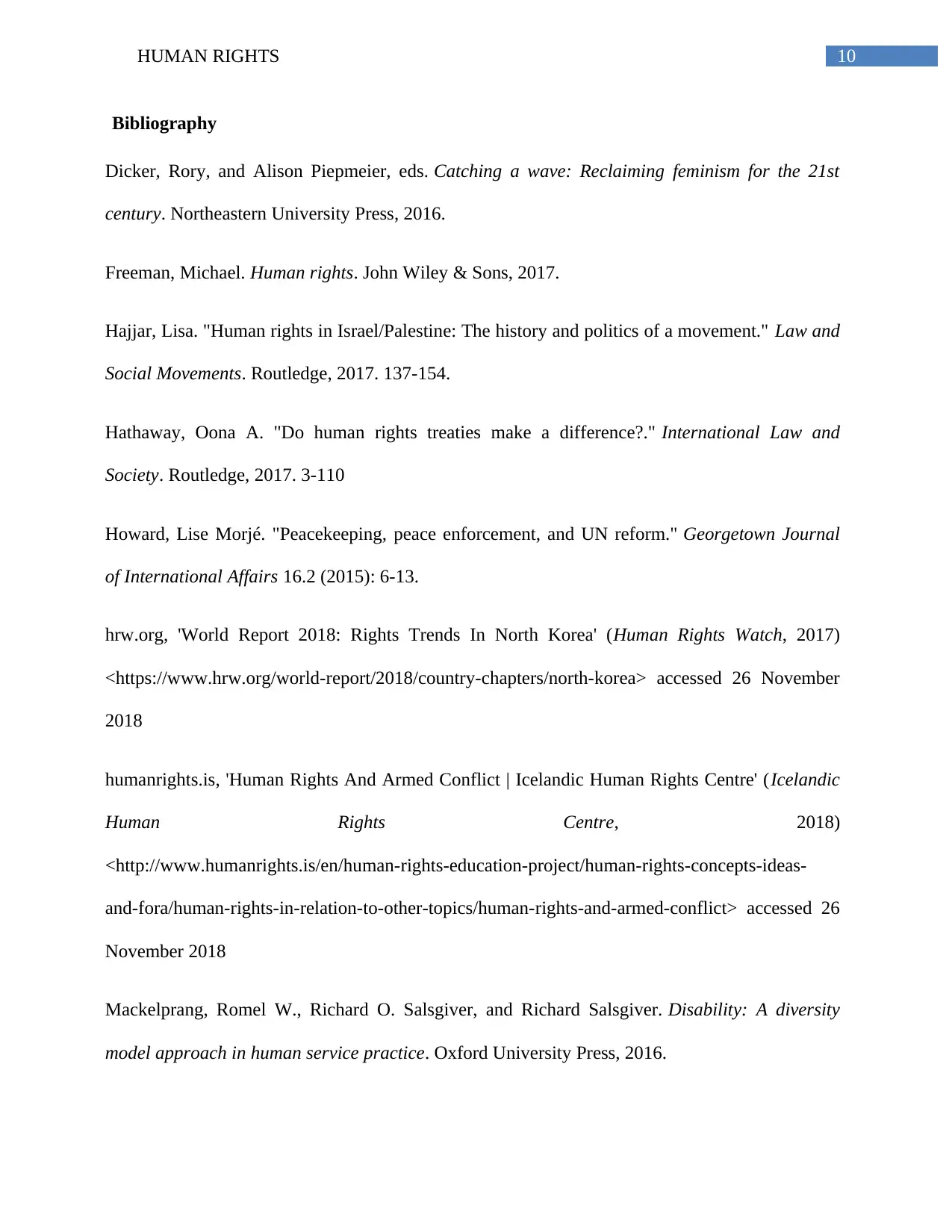
10HUMAN RIGHTS
Bibliography
Dicker, Rory, and Alison Piepmeier, eds. Catching a wave: Reclaiming feminism for the 21st
century. Northeastern University Press, 2016.
Freeman, Michael. Human rights. John Wiley & Sons, 2017.
Hajjar, Lisa. "Human rights in Israel/Palestine: The history and politics of a movement." Law and
Social Movements. Routledge, 2017. 137-154.
Hathaway, Oona A. "Do human rights treaties make a difference?." International Law and
Society. Routledge, 2017. 3-110
Howard, Lise Morjé. "Peacekeeping, peace enforcement, and UN reform." Georgetown Journal
of International Affairs 16.2 (2015): 6-13.
hrw.org, 'World Report 2018: Rights Trends In North Korea' (Human Rights Watch, 2017)
<https://www.hrw.org/world-report/2018/country-chapters/north-korea> accessed 26 November
2018
humanrights.is, 'Human Rights And Armed Conflict | Icelandic Human Rights Centre' (Icelandic
Human Rights Centre, 2018)
<http://www.humanrights.is/en/human-rights-education-project/human-rights-concepts-ideas-
and-fora/human-rights-in-relation-to-other-topics/human-rights-and-armed-conflict> accessed 26
November 2018
Mackelprang, Romel W., Richard O. Salsgiver, and Richard Salsgiver. Disability: A diversity
model approach in human service practice. Oxford University Press, 2016.
Bibliography
Dicker, Rory, and Alison Piepmeier, eds. Catching a wave: Reclaiming feminism for the 21st
century. Northeastern University Press, 2016.
Freeman, Michael. Human rights. John Wiley & Sons, 2017.
Hajjar, Lisa. "Human rights in Israel/Palestine: The history and politics of a movement." Law and
Social Movements. Routledge, 2017. 137-154.
Hathaway, Oona A. "Do human rights treaties make a difference?." International Law and
Society. Routledge, 2017. 3-110
Howard, Lise Morjé. "Peacekeeping, peace enforcement, and UN reform." Georgetown Journal
of International Affairs 16.2 (2015): 6-13.
hrw.org, 'World Report 2018: Rights Trends In North Korea' (Human Rights Watch, 2017)
<https://www.hrw.org/world-report/2018/country-chapters/north-korea> accessed 26 November
2018
humanrights.is, 'Human Rights And Armed Conflict | Icelandic Human Rights Centre' (Icelandic
Human Rights Centre, 2018)
<http://www.humanrights.is/en/human-rights-education-project/human-rights-concepts-ideas-
and-fora/human-rights-in-relation-to-other-topics/human-rights-and-armed-conflict> accessed 26
November 2018
Mackelprang, Romel W., Richard O. Salsgiver, and Richard Salsgiver. Disability: A diversity
model approach in human service practice. Oxford University Press, 2016.
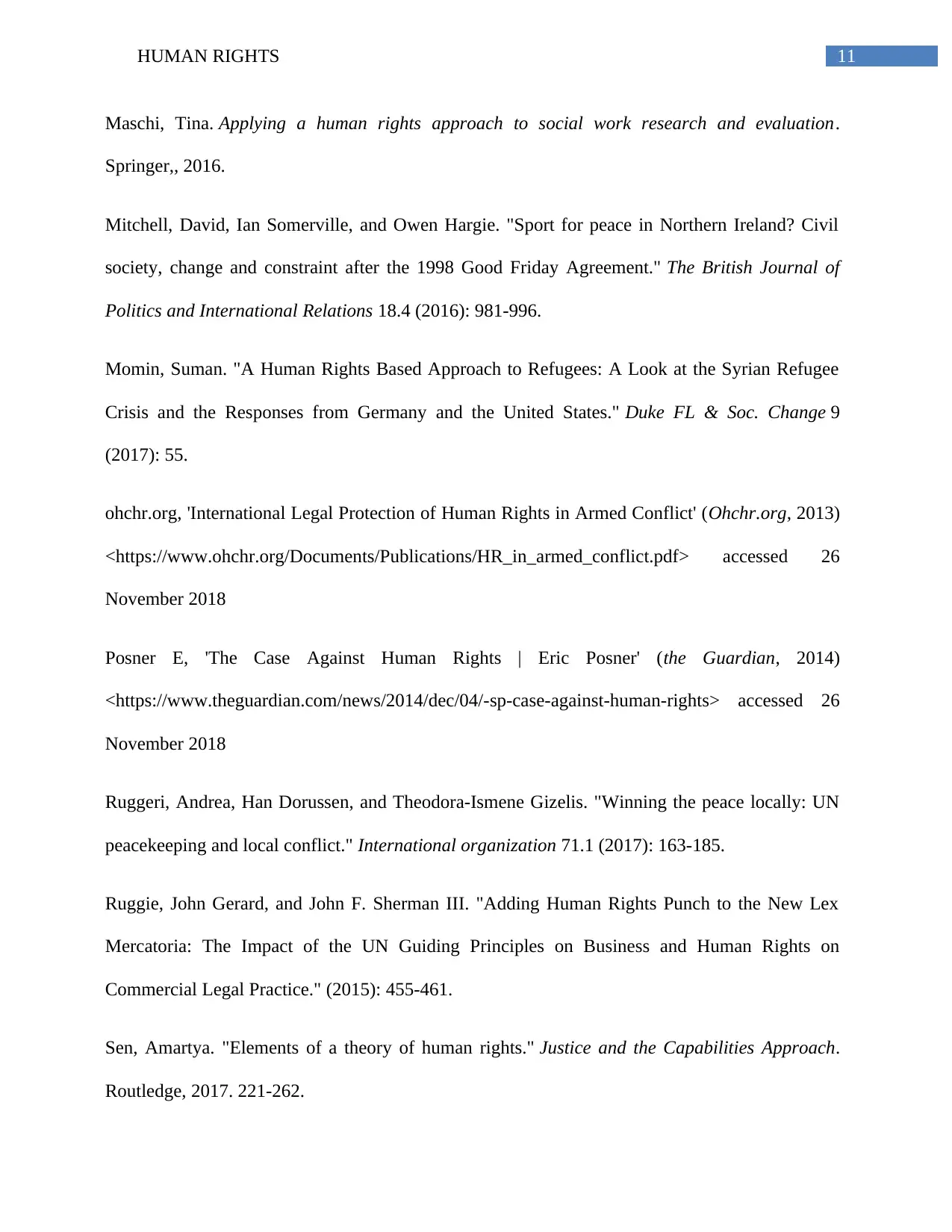
11HUMAN RIGHTS
Maschi, Tina. Applying a human rights approach to social work research and evaluation.
Springer,, 2016.
Mitchell, David, Ian Somerville, and Owen Hargie. "Sport for peace in Northern Ireland? Civil
society, change and constraint after the 1998 Good Friday Agreement." The British Journal of
Politics and International Relations 18.4 (2016): 981-996.
Momin, Suman. "A Human Rights Based Approach to Refugees: A Look at the Syrian Refugee
Crisis and the Responses from Germany and the United States." Duke FL & Soc. Change 9
(2017): 55.
ohchr.org, 'International Legal Protection of Human Rights in Armed Conflict' (Ohchr.org, 2013)
<https://www.ohchr.org/Documents/Publications/HR_in_armed_conflict.pdf> accessed 26
November 2018
Posner E, 'The Case Against Human Rights | Eric Posner' (the Guardian, 2014)
<https://www.theguardian.com/news/2014/dec/04/-sp-case-against-human-rights> accessed 26
November 2018
Ruggeri, Andrea, Han Dorussen, and Theodora-Ismene Gizelis. "Winning the peace locally: UN
peacekeeping and local conflict." International organization 71.1 (2017): 163-185.
Ruggie, John Gerard, and John F. Sherman III. "Adding Human Rights Punch to the New Lex
Mercatoria: The Impact of the UN Guiding Principles on Business and Human Rights on
Commercial Legal Practice." (2015): 455-461.
Sen, Amartya. "Elements of a theory of human rights." Justice and the Capabilities Approach.
Routledge, 2017. 221-262.
Maschi, Tina. Applying a human rights approach to social work research and evaluation.
Springer,, 2016.
Mitchell, David, Ian Somerville, and Owen Hargie. "Sport for peace in Northern Ireland? Civil
society, change and constraint after the 1998 Good Friday Agreement." The British Journal of
Politics and International Relations 18.4 (2016): 981-996.
Momin, Suman. "A Human Rights Based Approach to Refugees: A Look at the Syrian Refugee
Crisis and the Responses from Germany and the United States." Duke FL & Soc. Change 9
(2017): 55.
ohchr.org, 'International Legal Protection of Human Rights in Armed Conflict' (Ohchr.org, 2013)
<https://www.ohchr.org/Documents/Publications/HR_in_armed_conflict.pdf> accessed 26
November 2018
Posner E, 'The Case Against Human Rights | Eric Posner' (the Guardian, 2014)
<https://www.theguardian.com/news/2014/dec/04/-sp-case-against-human-rights> accessed 26
November 2018
Ruggeri, Andrea, Han Dorussen, and Theodora-Ismene Gizelis. "Winning the peace locally: UN
peacekeeping and local conflict." International organization 71.1 (2017): 163-185.
Ruggie, John Gerard, and John F. Sherman III. "Adding Human Rights Punch to the New Lex
Mercatoria: The Impact of the UN Guiding Principles on Business and Human Rights on
Commercial Legal Practice." (2015): 455-461.
Sen, Amartya. "Elements of a theory of human rights." Justice and the Capabilities Approach.
Routledge, 2017. 221-262.
⊘ This is a preview!⊘
Do you want full access?
Subscribe today to unlock all pages.

Trusted by 1+ million students worldwide
1 out of 13